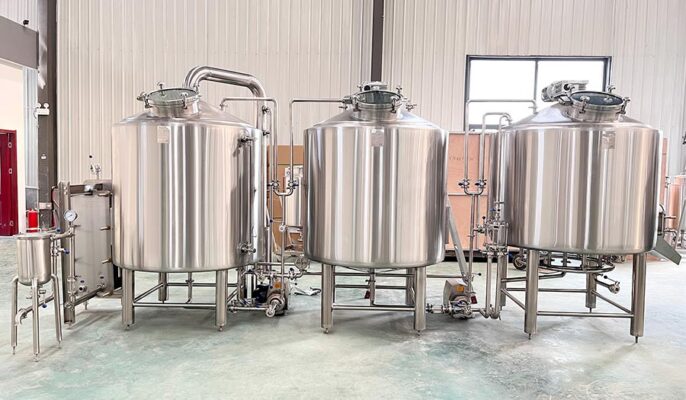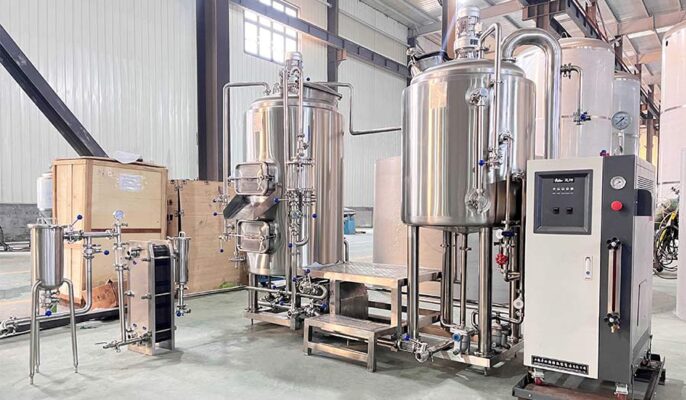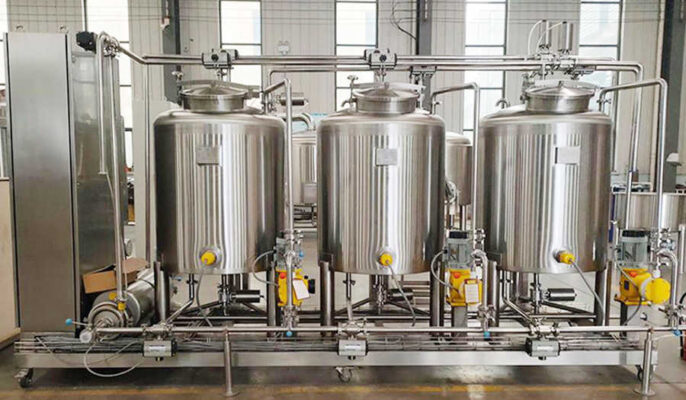Home beer brewing is a popular hobby that produces high quality craft beers. With the right equipamento de fabricação de grãos, beer enthusiasts can recreate commercial style beers at home. This guide will provide a comprehensive overview of the equipment required, from basic kits for beginners to advanced systems for experienced homebrewers.
Guia de equipamento
The main types of grain brewing equipment are:
- Chaleiras de cerveja – The fundamental vessel used for mashing grains and boiling wort. Available in stainless steel or aluminum. Sizes range from 5 gallons to 15+ gallons.
- Purê de tuns – Insulated vessels used for mashing grains. Usually accompanied by a false bottom or stainless steel braid to filter grain particles.
- Fermentadores – Food-grade plastic buckets or glass/stainless steel carboys used for fermenting beer. Available in 3-10 gallon sizes.
- Acessórios – Equipment for moving liquids, regulating temperature, measuring ingredients, etc. e.g. hoses, pumps, chillers, thermometers, hydrometers.

Tipos de equipamento
| Equipamento | Descrição | Entry Level Option | Advanced Option |
|---|---|---|---|
| Chaleira de cerveja | Fundamental vessel for mashing grains and boiling wort. | 5-gallon stainless steel pot | 10-15 gallon stainless steel kettle with thermometer |
| Tina de brassagem | Insulated vessel for mashing grains, usually with false bottom or filter to separate wort. | 5-10 gallon plastic cooler cooler with stainless braid/copper manifold | Custom stainless steel mash tuns with temperature controls |
| Fermentador | Food-grade plastic bucket or glass/stainless steel carboy for fermenting beer. | 6.5 gallon plastic bucket fermenter with lid and airlock | 7 gallon stainless steel conical fermenter with temperature control |
| Acessórios | Equipment for moving liquids, regulating temperature, taking measurements. | Nylon hoses, copper wort chiller, plastic paddles, hydrometer | Stainless steel transfer pumps, plate chiller, stainless steel spoon, refractometer |
Visão geral do processo de fabricação de cerveja
The basic homebrewing process with grain brewing equipment is:
- Esmagamento – The mash tun is filled with crushed grains and hot water for enzymatic conversion of starches into fermentable sugars. The mixture is held at 148-158°F for 60-90 minutes.
- Lautering – The sweet wort is drained from the grains in the mash tun through the false bottom or filter leaving behind the grain husks. Water is rinsed over grains to extract more sugars.
- Ebulição – The wort is boiled in the brew kettle for 60-90 minutes with hops added at intervals to impart bitterness, flavor, and aroma. Proteins and compounds are coagulated.
- Arrefecimento – The hot wort is rapidly chilled after the boil to 60-70°F to avoid off-flavors before transferring to the fermenter.
- Fermentação – Yeast is pitched into the cooled wort in the fermenter. Over 2+ weeks yeast ferments sugars into alcohol and CO2 conditioning the beer.
- Embalagem – The fermented beer is carbonated, bottled or kegged for serving.
Equipment Capacity, Dimensions and Customization
| Equipamento | Gama de capacidades | Dimensões típicas | Opções de personalização |
|---|---|---|---|
| Chaleiras de cerveja | 5-30 gallon batches | 16-24 inches diameter, 16-32 inches tall | Material choice (stainless, aluminum, ceramic), thermometers, sight glasses, ball valves, pumps, controllers |
| Tinas de brassagem | 5-20 gallon batches | Coolers: 48-108 quarts Cylinders: 12-30 inches diameter, 12-36 inches tall | False bottom design, filter type, insulation thickness, thermometers, sight glasses, ball valves, controllers |
| Fermentadores | 3-15 gallon batches | Buckets: 12-20 inches diameter, 15-35 inches tall Carboys: 6-14 inches diameter, 15-30 inches tall | Material choice (plastic, glass, stainless), conical vs. cylindrical, temperature controls, pressure capable |
Equipamento para fabricação de grãos Fornecedores e gamas de preços
| Equipamento | Entry Level Supplier & Price | High End Supplier & Price |
|---|---|---|
| Brew Kettle Kits | Northern Brewer – $100 to $250 | Blichmann Engineering – $500 to $1,200 |
| Mash Tun Kits | Northern Brewer – $100 to $200 | Stout Tanks – $800 to $2,000 |
| Fermentadores | Adventures in Homebrewing – $30 to $200 | Ss Brewtech – $300 to $800 |
| Immersion Wort Chillers | Northern Brewer – $70 to $150 | Jaded Brewing – $200 to $500 |
| Plate Chillers | Adventures in Homebrewing – $90 to $250 | Blichmann Engineering – $300 to $700 |
Instalação, operação e manutenção
| Tarefa | Instructions | Frequência |
|---|---|---|
| Configurar | Review equipment instructions for capacities, temperatures, pressures etc. Connect hoses, cables, controllers per diagrams. | One time |
| Limpeza | Use appropriate cleaners for equipment material (e.g. PBW). Scrub then rinse with hot water or chemical sanitizers. | Every batch pre- and post-brew |
| Substituição | Monitor for leaks, blockages, performance issues. Replace worn parts like o-rings, ball valves, braids etc. | Every 5-10 batches or per manufacturer |
| Calibração | Ensure accurate readings on temperature controllers and density meters via calibration. | Once per year |
How to Choose Grain Brewing Equipment
| Critérios | Orientações para a avaliação |
|---|---|
| Tamanho do lote | Match equipment capacities to typical batch volumes – account for double batches. Standard is 5-10 gallons. |
| Orçamento | All grain equipment has wide cost range. Set budget then identify best value equipment components. |
| Potência | Ensure adequate electrical for heating elements and temperature controllers. Plan 220V for 4500W+ elements. |
| Materiais | Stainless steel preferred for durability but aluminum or glass also common for cost savings. Ensure food-safe. |
| Quality Components | Seek reputable supplier brands for kettles, tuns, chillers etc. Select thick stainless steel with tri-clad bottom. |
| Facilidade de utilização | Pick equipment like pumps and chillers that reduce heavy lifting. Prioritize easy cleanability and maintenance. |
| Limpeza e saneamento | Review product ease of cleaning and compatibility with various cleaners and sanitizers like Star San and PBW. |
| Dimensões | Measure space in brewery to ensure all equipment can fit together properly with room for movement. |
| Flexibilidade | Pick tun sizes to accommodate different batch sizes and brewing styles like lagers and high gravity beers. |
Comparing Pros and Cons of Equipamento para fabricação de grãos
Entry Level Brew Kettle Kits
| Prós | Contras |
|---|---|
| Lower cost stainless models available | Thinner metals may dent |
| Typically include ball valves for transfers | Smaller sizes limit batch lengths |
| Offer kits tailored to home brewing | Maximum temperatures may be capped |
| Provide all fundamental brewing capability | May eventually want to upgrade higher quality kettle |
Fermentadores cónicos
| Prós | Contras |
|---|---|
| Compact size uses less space | Much more expensive than plastic buckets |
| Easy transfer of beers with bottom ports | Heating and cooling requires temperature controllers |
| Allows closed transfers limiting oxygen exposure | Conicals difficult to properly clean without special tools |
| Stainless models match pro breweries | Typically only larger volumes 6 gallons+ |
Additional Comparisons
Plastic Bucket vs. Glass Carboy Fermenters
- Plastic is lighter, cheaper, and less fragile but scratches easily and is more oxygen permeable.
- Glass allows you to visually monitor fermentation, but is heavy, breakable, and costs more.
Immersion vs Plate Wort Chillers
- Immersion chillers are simple to use and cheaper, but slower to chill wort and hard to fully sanitize.
- Plate chillers provide fast chilling and better sanitation but have lower hot side aeration risk and higher equipment cost.
Equipamento adicional de fabrico de cerveja
While a basic all-grain brewing setup requires a mash tun, kettle, and fermenter, there is other equipment that can improve efficiency, convenience and end product quality:
Bombas
- Help move liquid between vessels without lifting and pouring
- Reduce heavy lifting of hot/full kettles and carboys
- Impellers must be cleaned and sanitized to avoid contamination
- March or Chugger pumps popular among homebrewers
Queimadores
- Provide high heat output to boil wort and maintain mash temperatures
- Propane burners offer portability and low cost
- Electric heating elements allow more automation
- High wattage (3500W+) required for 5+ gallon batches
Grain Mills
- Freshly crushed grains have better efficiency and flavor
- Consistent crush essential for good lautering and clear wort
- Corona and Barley Crusher popular quality grain mill brands
- Must be properly adjusted and cleaned to avoid stuck sparges
Limpeza e saneamento
- PBW and Star San leading cleaning/sanitizing products
- Rotation of cleaners prevents build up and resistance
- Clean during brewing to prevent baked-on residue
- Carefully sanitize fermenters, chillers, pumps to prevent infections
- Store grains properly to avoid molds and oxidation
Controlo da temperatura de fermentação
- Precise temp control during fermentation reduces off-flavors
- Cooler temps promote clean lager characteristics
- Consistent ale temps maximize intended ester development
- Glycol chillers, heat belts, or fermentation chambers used
Gestão de leveduras
- Pitching enough healthy yeast is critical for quality beer
- Starters propagate cell counts for proper fermentation
- Stir plates and erlenmeyer flasks effectively grow starters
- Store yeast properly before use for viability and vitality
Draft Systems
- Complete draft/kegging systems available from homebrew suppliers
- Force carbonate finished beers for serving on tap
- Includes CO2 tank, regulators, kegs, shanks, faucets
- Provides convenience of pub style pours at home
Automatização avançada
- Hybrid systems integrate electric heating and pumping
- Programmable controllers manage mashing and fermentation
- Recirculation during mashing increases efficiency
- Requires electrical infrastructure and control knowledge
FAQ
What are the most essential pieces of equipment for all grain brewing?
The absolute necessities are a mash tun for soaking grains, a boil kettle for boiling wort, a fermenter for fermentation, and accessories like an immersion chiller for cooling boiled wort. These pieces allow executing the fundamental brewing process.
What size brew kettle is best for 5 gallon all grain batches?
For a standard 5 gallon batch with potential for a 90 minute boil, an 8-10 gallon brew kettle is optimal. This allows adequate headspace to prevent boilovers. Experienced brewers may use 7.5-8 gallon kettles.
How many fermenters are recommended when starting all grain brewing?
When first getting into all grain brewing, beginning with two 6-7 gallon primary fermenters is recommended. This allows brewing consecutive batches and experimenting with different yeasts. Optionally add a secondary vessel for aging beers.
Is temperature control absolutely necessary for all grain homebrewing?
While many homebrewers start without temp control, managing fermentation temperatures is highly recommended for making clean consistent beer. Simple DIY insulation wraps help minimize swings. Getting a chamber or glycol system is ideal.
What efficiency differences exist between a plastic cooler mash tun and stainless steel tun?
Cooler mash tuns can achieve 60-75% brewhouse efficiency, with proper gap setting on the false bottom. All stainless steel mash tuns with insulation and tight precision parts can reach 75-85% efficiency regularly in the hands of an experienced brewer.
How many years does quality all grain equipment last?
Quality stainless steel brew kettles, conical fermenters, and mash tuns that are properly maintained can last more than 10 years for an avid homebrewer. Items with gaskets, o-rings and moving parts may need minor replacement parts after extended heavy use.






